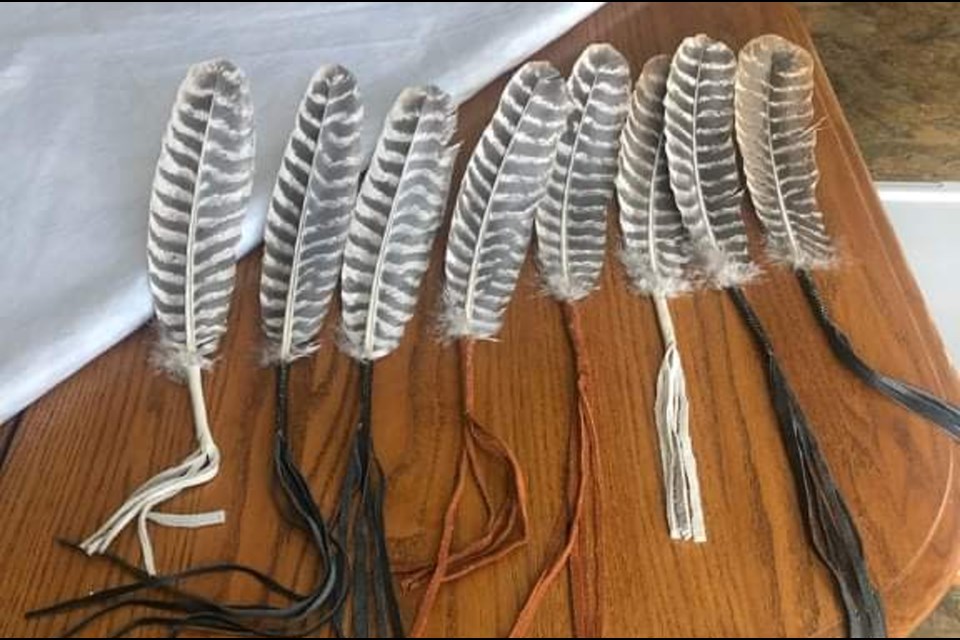Wellbriety is a traditional approach to the 12-Step AA program, comprised of cultural teachings intended to travel beyond the scope of sobriety into overall social, emotional, mental, physical and spiritual well-being.
Don Coyhis is President and Founder of White Bison, Inc., the Native American non-profit organization which started Wellbriety.
Sault Tribe Behavioral Health Manager Laura Collins-Downwind said Wellbriety was incorporated into the facility’s recovery treatment only four years ago.
“AA and NA are not popular choices among Native American communities,” said Collins-Downwind. “Wellbriety incorporates our spirituality into the meetings.”
Tribal member Russ Rickley runs St. Ignace Wellbriety, apart from behavioral health. He also saw a need for it in the area.
“It’s a recovery program that most Native Americans are using,” Rickley said. “I first got introduced to it when visiting my daughter out in Seattle 10 years back. Native tribes were using it out there.”
Collins-Downwind and Rickley are both strong proponents of Wellbriety treatment, which can be used by anyone.
“In the beginning, the creator gave these teachings to everybody,” Rickley said.
Native traditions were temporarily lost during oppressive times when Indigenous people were unable to practice their beliefs.
It was not until the American Indian Religious Freedom Act of 1978 (AIRFA) when U.S. congress passed legislation signed by President Jimmy Carter, enabling Native Americans to exercise the freedom to worship through ceremonials and traditional rites.
“When they gave us permission, we were able to get our bundles back out and start practicing the native way,” Rickley said. "We had very few Native Americans practicing the culture, so it was hard to get the teachings started.”
Traditional methods rely on smudging, tobacco, fire and medicines.
“Tobacco is how we practice everything we do,” said Rickley. “The four medicines are sage, tobacco, cedar and sweetgrass. What we're teaching is very basic.”
Participants learn about the seven grandfathers and their gifts of love, respect, humility, truth, bravery, wisdom and generosity.
Wellbriety combines such instruction with the 12-steps of AA to bring people closer to their creator.
“You have got to have a power greater than yourself,” said Rickley. “It could be in any religion and you could have any God.”
Collins-Downwind talked about how people lived for generations to establish cultural teachings into natural law. Therefore, the focus is on finding oneself and identity through cultural understanding.
Everyone will learn the creation story, telling of beginning times and purpose. Native lessons send willing participants straight to the sweat lodge, where each is called by their spirit-name.
“We should speak in native tongue, because the creator doesn't really recognize who you are until you say your native spirit-name,” said Rickley. “That's one of the things we teach.”
Those without a spirit name may continue to learn and participate. They will learn how to start a sacred fire with flint.
“The smoke rises up to the heavens,” Rickley said. “People on the other side don't have tobacco. When you pray with your tobacco, you are offering it up to the creator and people on the other side. They are more than willing to answer your prayers.”
People learn the components of a bundle, which could be a smudging bowl, with sage and a feather. They are taught about tobacco harvest, drying and seed removal.
“We taught them how to make medicine bags,” said Rickley. “We brought a bunch of leather in for everybody to sew medicine bags. We offered tobacco to break up and put their bags.”
In return of his efforts, Rickley and his tribe were gifted with a wooden eagle and staff.
“We started making the eagle staff back in May,” he explained. “A gentleman who was coming to the meetings went out and got us a diamond willow staff.”
Many have since taken part in building the eagle staff, which will be used in ceremonies and paraded about during recovery walks.
Around 12 to 14 people make up the core group of St. Ignace Wellbriety, while others come and go.
"People seeking recovery struggle with a lot of different issues and problems,” Rickley said from the viewpoint of a recovering alcoholic. “If you have problem with alcohol, you have to believe that there's a power greater than yourself. You must be willing to turn all of your will and power over to the creator.”
Wellbriety seeks to offer the lessons needed to help people transition from a life of addiction to a life of fulfillment in recovery.
St. Ignace Wellbriety meeting are held Wednesdays at 7 p.m. For more details, call Russ at 906‑440‑5696.
Sault Tribe Tribal Action Plan Wellbriety meeting takes place Tuesdays and Thursdays at the Niiaanagiizhik Ceremonial Building on 11 Ice Circle.
Behavioral health has increased treatment across the seven counties. The Sault Tribe Health Division’s main site is located at the Sault Ste. Marie Tribal Health Center on 2864 Ashmun Street of Sault Ste. Marie. Its phone number is 906-632-5200.



